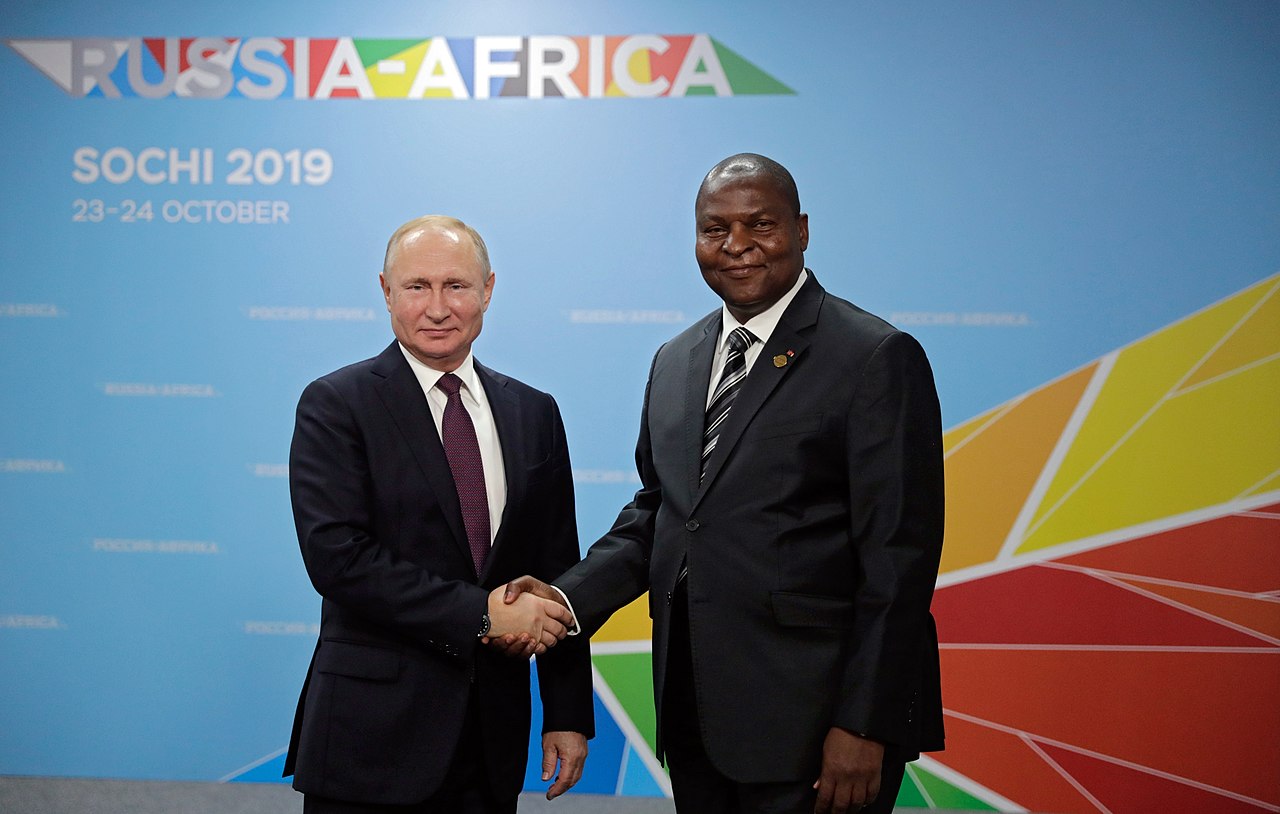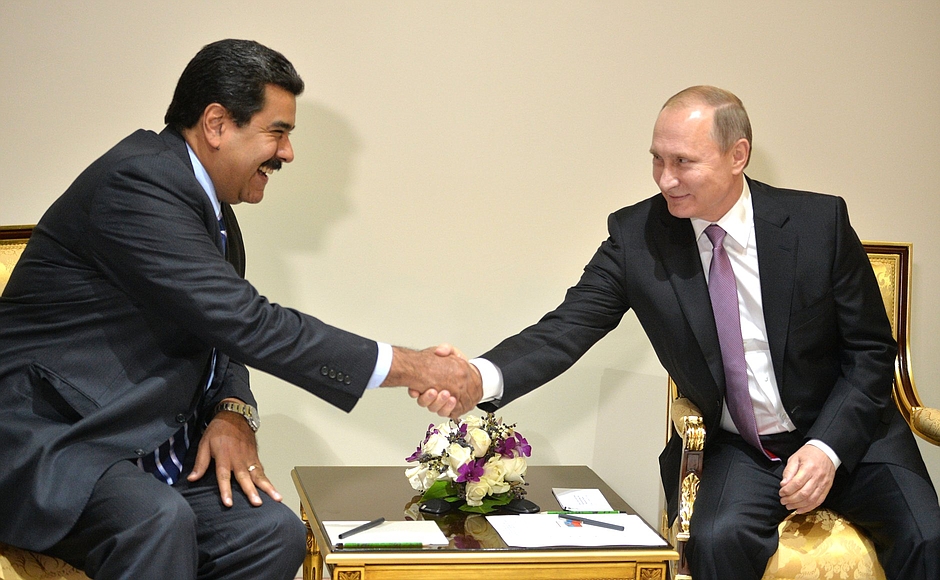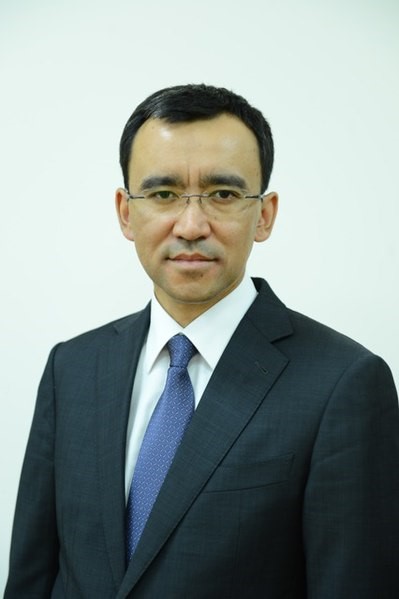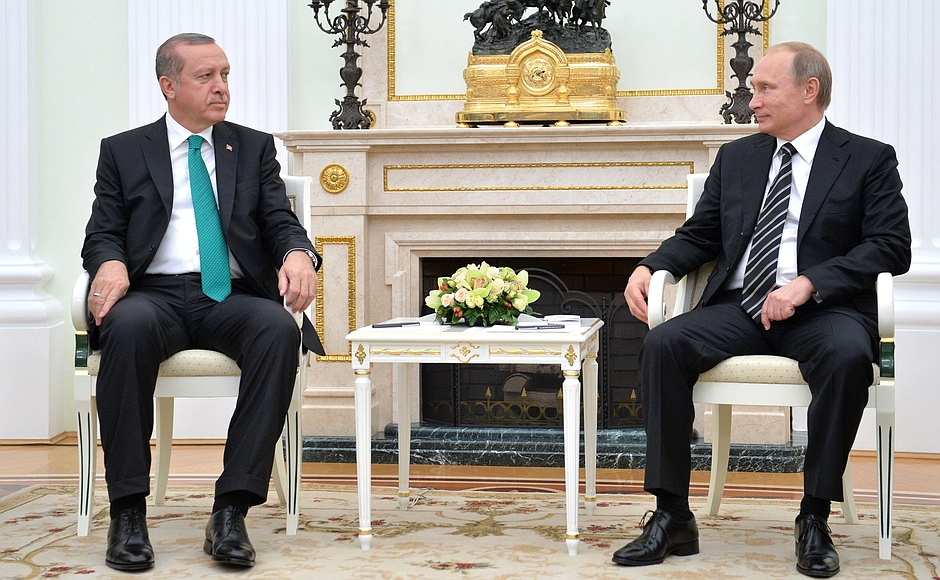
Putin with Faustin Archange Touadera, President of the Central African Republic, whose nation has used Russia’s Wagner Group on several occasions, including to prevent an overthrow of the government.
“African countries are treading carefully in the Russia-Ukraine war to protect their national interests even as they defend the rights of Africans trapped in war zones.”
Many African leaders are choosing their words carefully when discussing Russia’s invasion of Ukraine. As the accompanying excerpted article from the East African explains, these leaders’ cautious approach is based on the close relationships their countries have with Russia. This is especially evident in the area of arms sales. Many African nations purchase their military hardware from Russian arms dealers. For example, Ethiopia’s entire fleet of jetfighters, 20 Sukhoi-27s and nine Mig-23s, are from Russia. Russia supplies three quarters of Uganda’s combat helicopters. Across Africa it is not just aircraft, but rather a wide range of military materiel, including small arms such as the ubiquitous AK-47.
As the article explains, Russia has also fostered military alliances with Mali, the Sudan, Mozambique and other countries facing insurgencies or political instability, which has tempered still more African leaders’ reactions to the Russia’s invasion of Ukraine. The Wagner Group, a Kremlin-linked paramilitary force, helped quash an attempt to overthrow the government in the Central African Republic. The appreciation for these Russian interventions, combined with a sense among many Africans that their nations should remain neutral with regard to European problems, contributes to the lack of enthusiasm some African leaders have for denouncing Russia’s invasion of Ukraine. Reports of African students fleeing Ukraine only to be subjected to extreme racism in Europe may have exacerbated these concerns.
Some African leaders are not only refusing to condemn Russia but are actually praising it. The most prominent example of such behavior comes from LTG Kainerugaba, Commander of Ugandan Land Forces, who is also President Musevini’s son. While Uganda abstained from a UN vote condemning Russian aggression, citing the African country’s nonaligned status, Kainerugaba claimed Putin was right and that a majority of non-whites support Russia. Even Senegal, which has a long history of receiving military assistance from the West, abstained from the UN vote to condemn Russian aggression.
Source: Aggrey Mutambo, “National interests prevail as African leaders tread carefully on Ukraine crisis,” The East African (African-based media company), 6 March 2022. https://www.theeastafrican.co.ke/tea/news/east-africa/national-interests-african-leaders-careful-ukraine-crisis-3738398
African countries are treading carefully in the Russia-Ukraine war to protect their national interests even as they defend the rights of Africans trapped in war zones.
Senegalese President Macky Sall, chair of the African Union and the African Union Commission chairperson Moussa Faki Mahamat said they were “particularly disturbed” by reports that some Africans had been turned away at European borders while trying to leave the war-wracked country.
Save for Kenya, Eastern African states have stayed away from vigorously commenting on Russia’s invasion of Ukraine, but the racism in its wake has angered Africans.
The United Nations, which operates a huge fleet of Russian fixed-wing and helicopter transports, will not be spared the sanctions. Also, hard-hit will be a helicopter overhaul and maintenance repair facility that Uganda jointly owns with Russia’s Pro-heli International Services, that was launched by President Museveni in late January. The facility was among others targeting the UN missions in the Democratic Republic of Congo and Sudan’s Darfur region, in which a substantial number of UN transport helicopters operate.
“Outside of the Central African Republic, which openly sympathises with Moscow, other countries have largely chosen a middle plan in this conflict, even as they share (Kenya’s Permanent Representative to the UN, Dr Martin) Kimani’s sentiments on the territorial integrity and sovereignty of Ukraine. They are, however, united on the plight of Africans in Ukraine,” he said.
Image Information:
Image: Putin with Faustin Archange Touadera, President of the Central African Republic, whose nation has used Russia’s Wagner Group on several occasions, including to prevent an overthrow of the government.
Source: Mikhail Metzel/Kremlin Pool/Wikimedia Commons, https://commons.wikimedia.org/wiki/File:Vladimir_Putin_%26_Faustin_Touadera_-_2019.jpg
Attribution: CC BY 4.0



